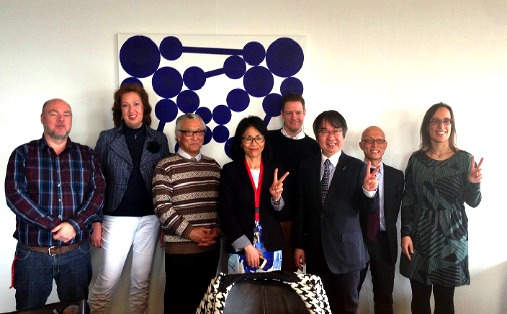Education from here to Tokyo
Gepubliceerd: 16 April 2015 • Leestijd: 3 minuten en 8 seconden • English Dit artikel is meer dan een jaar oud.Project-based working? They’re not familiar with that in Japan. Seminars to provide you with guidance during the final year of your studies? We’re not familiar with that in the Netherlands. Teachers Fumiko Inoue and Suzanne Fagel decided it was time for close collaboration.

In March, three Japanese professors visited the Rotterdam University of Applied Sciences. The three of them, working at the J.F. Oberlin University and Meiji University in Tokyo, were invited to collaborate with the TMA (Trade Management, focused on Asia) study program.
Project-based working: unknown in Japan
TMA teacher Fumiko Inoue believed that a collaboration with Japan was highly important. ‘Every year, a number of students go to Japan. This is a mandatory part of their studies if they’ve chosen to specialize in Japanese. The teachers, however, barely maintain contact with each other. I believed that needed to change. Japan employs completely different teaching methods, and they’re not familiar with our way of working. Together, we can learn from each other.’
Kosaku Dairokuno, Kiyoshi Hori, and Fumitake Nakamura followed second-year TMA students for one week. Especially project-based working and the related meetings are new to the Japanese. ‘We’re not familiar with this,’ says Dairokuno. ‘Our education style is much less interactive. The teacher speaks, the student listens, and the aim is to convey the required knowledge.’
Formal lecture
This is exactly what happened when professor Hori taught a guest lecture on SMEs (small and medium enterprises, called ‘MKB’ in Dutch) and entrepreneurs. For nearly an hour, he spoke about 93-year-old women in the mountains of Japan, picking leaves that serve as decorations in Tokyo’s most prestigious restaurants. Such a formal lecture is a familiar phenomenon to Mark (23), who studied in Tokyo last year. ‘All classes are in lecture form, indeed. Even though we were in a different class than the Japanese students, they were – as far as I know – taught in the same way.’ Was it better than the Dutch way of teaching? ‘I don’t know, both of them have their advantages. In any case, it was a lot easier,’ he smiles.
Nevertheless, TMA teacher Christophe van Puymbroeck believes that the Netherlands can learn something from Japan. ‘I visited the J.F. Oberlin University in November and was very impressed. Especially in the final year of studies, they work a lot with seminars. Students help each other forward tremendously in study groups; for example, by studying literature together. I still miss that with TMA. Here, students work towards their thesis for three years, and then, they’re all on their own. That doesn’t end well for quite some people.’
187,000 euros in financial aid
Last year, the European Union greenlit Inoue’s request to set up a collaboration with the Japanese universities. This resulted in the VIBE project. The requirement was that one other university in Europe would be involved in the project, as well as two universities in Japan. Inoue found the second European University in Finland: the University of Eastern Finland. ‘They have a similar course of study and also send students to Japan every year. The university and the Finnish partner received 187,000 euros in fundings for the next three years. The Japanese universities receive financial aid from their own government.’
Part of the money is intended for the students. For a four-month stay, they receive 1,000 euros a month as well as 1,500 euros to be able to finance their flight. Moreover, a number of teachers will pay a visit to the universities in Japan every year. ‘This way, we can see how are students are doing with our own eyes, and we catch up about education with the Japanese teachers,’ explains Inoue.
Internship in Japan
A number of things in the course program will also change. ‘Dutch and Finnish exchange students will collaborate with Japanese students to a higher extent,’ says Hori. ‘They will also do an internship at a Japanese company for a couple of weeks, and we, as a university, will provide them with guidance on that. Exchange students from other countries that do not participate in this project don’t do an internship.’
Setting up these types of internships is completely new to Japan. Suzanne Fagel, who set up the VIBE project with Inoue, says this is special. ‘It’s unique. We are also proud that our Japanese partners want to introduce project-based education. Our education is, so to speak, being exported to Tokyo.’
The first group of Dutch students is leaving for Japan this month. Mark, who went to Japan as a ‘regular’ exchange student last year, did not receive any money from the university at that time. ‘Yes, that kind of sucks. I just barely missed out. Oh well, I did have an amazing time, and that’s what’s most important.’
Femke Radder






Laat een reactie achter
Spelregels
De redactie waardeert het als je onder je eigen naam reageert.
Lees hier alle details over onze spelregels.
Aanbevolen door de redactie
Docenten starten petitie: HR moet zich uitspreken tegen schending mensenrechten in Gaza
Vervroegde renovatie Museumpark gaat zorgen voor ingrijpend verhuiscircus
Ondernemende Ad-student Joyce start op HR pilot met gratis menstruatieproducten
Back to Top